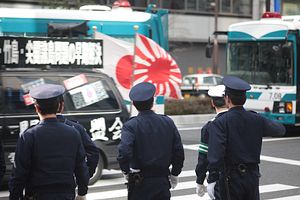On Sunday, June 29, a man set himself on fire in protest against Prime Minister Shinzo Abe’s plan to reform the constitution in order to expand the scope of the Japanese military.
The incident happened around 1:20 p.m., after the man gave an hour-long speech on a pedestrian bridge in Shinjuku, downtown Tokyo. He was hosed down by the Tokyo Fire Department, who were at the scene after receiving an emergency call that a man was about to commit suicide from a bridge. The man was taken to hospital with serious injuries.
The self-immolation quickly became a major topic among Japanese users of social media sites such as Twitter, and was also reported by foreign network channels such as the BBC and China’s CCTV.
However, Japan’s national public broadcasting organization, NHK, decided to skip the topic on its flagship and bilingual 7:00 p.m. news, despite it being one of the most talked about, and tweeted, events of the news cycle.
Opposition to Abe’s plans to reinterpret Article 9 of the Japanese Constitution is widespread, and some dissenters have taken to the streets in protest. Critics claim that a constitutional change to enable the use of collective military force would be a radical departure from Japan’s postwar pacifism, and would further antagonize a relationship with China that is already strained over the disputed Senkaku/Diaoyu Islands.
NHK is a public organization chartered by the Japanese Broadcasting Act, which is funded through license fees that viewers in Japan are obligated to pay according to the Broadcast Law. The broadcaster’s 12-member board of governors are appointed by the Diet.
Katsuto Momii, the current president of NHK, expressed his loyalty to the government at a conference held in January this year. When asked if NHK would report on international issues from only Japan’s perspective, he responded that that was his duty, “If the government says right, I won’t say left.” In this case, NHK is indeed reporting right and ignoring the left.
When Momii was asked about the comfort women issue with South Korea, he responded that it was something that every nation made use of, not just Japan. He also said that the treaty signed between South Korea in 1965 has resolved the situation, and so he did not understand why it kept being raised.
This was not the first time NHK has faced controversy on the comfort women issue. It was accused of censoring and editing out crucial content in a documentary that aired in 2001. It was latter acquitted by the Supreme Court.
NHK also sparked protests in 2012, when it censored and edited the emperor’s speech on the Fukushima Daiichi nuclear disaster that subtly contradicted the government’s statements.
The broadcast’s decision to ignore Sunday’s shocking incident will doubtless give its critics further ammunition.

































